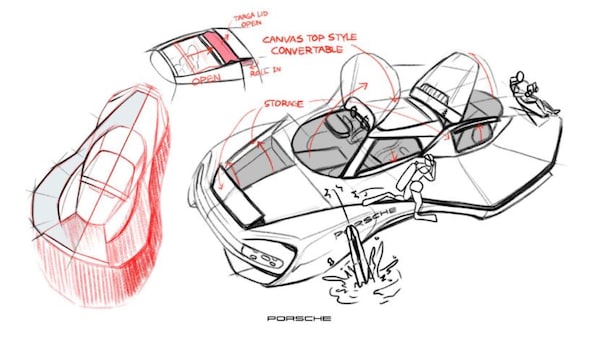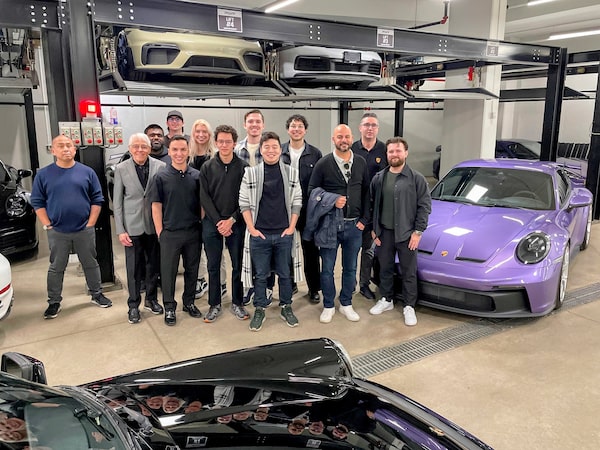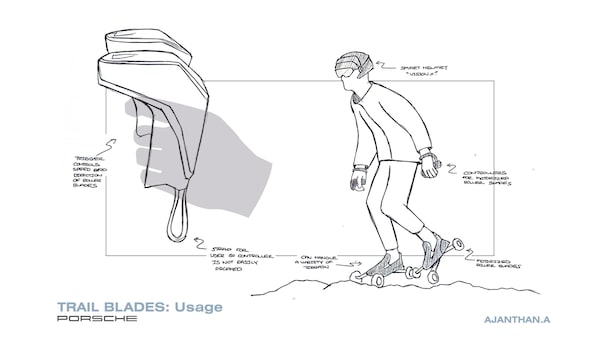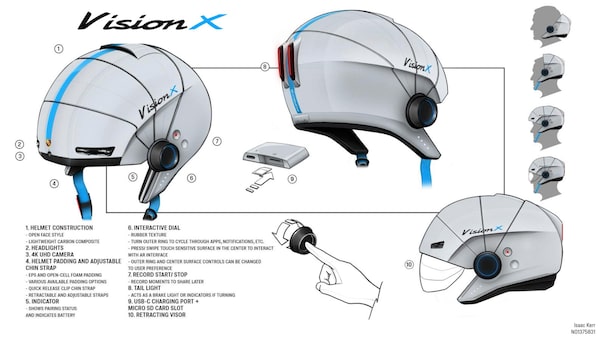
Porsche flying yacht concept by Myoungchan Kim.Handout
In a boardroom overlooking millions of dollars of new and collectible cars at the expansive Porsche Centre Vaughan, just north of Toronto, a class of industrial design students from Humber College pitched dealership executives on a future for Porsche that goes way beyond cars.
Students presented an augmented-reality helmet, an electric microcar, a motorbike with all-directional spherical wheels, electric roller skates, a go-kart, a personal drone-copter, a flying yacht and even a jet-pack, all of which looked convincingly like Porsche products from 2030 or 2040.
Although Porsche Canada had no involvement, these student proposals are answers to real questions facing the auto industry, said Laurance Yap. As senior manager of sustainability and special projects for Pfaff Automotive Partners, which owns this Porsche dealership, Yap advised students alongside Ken Cummings, former car designer and a professor of industrial design at Humber.
“There are cities in Europe starting to ban cars from city centres,” Yap said. “And for a brand like Porsche … how do you expand into a space where you may no longer be able to sell cars? Or, even if you continue to sell cars, [customers] may need or want other transportation devices on top of that.”

A class of transportation-design students from Humber College pitched dealership executives on a future for Porsche that goes way beyond cars.Matt Bubbers/The Globe and Mail
Cummings’ class rose to the challenge. Ethan Medeiros pitched his 2032 Porsche 9EE concept – an upright single-occupant vehicle smaller than a Smart car – as a luxurious electric mobility solution for condo dwellers. “Maybe they already own a Porsche, but they want something specifically for commuting, especially given new regulations we’re seeing with the [congestion] fees in some cities,” Medeiros said.
Industrial design student Isaac Kerr pitched a Porsche helmet for 2028. Dubbed Vision X, the helmet’s visor doubles as an augmented-reality (AR) display. For track days, it offers Porsche drivers real-time coaching to improve their lap times. For daily commutes, Kerr said, his Porsche helmet would connect to Porsche e-bikes, e-skateboards or any number of other mobility solutions.
Porsche Centre general manager Jimmy Vervitas and general sales manager David Chichelnik weighed in on each concept, asking about prices and how each product would fit within Porsche’s tightly defined brand.

Porsche Trail Blades concept by Ajanthan Anantharan.Handout
Student Ajanthan Anantharan, who proposed electric roller skates as a possible product line extension, is aiming to break into the world of professional car design. “In middle school, I found out that designing cars was a job, and ever since then I’ve just been asking teachers how to get there,” he said.
Carlie Besser is looking for a career in industrial design more broadly. “I’m very open to all aspects of it: product design, accessory design, everything,” she said. Her 2034 Porsche Omniturbo motorcycle concept included spherical, all-directional wheels to better navigate cramped urban environments. (It may sound very sci-fi, but tire manufacturer Goodyear has researched this technology, which could make motorcycles much safer and easier to ride.)
Some graduates from Humber’s Industrial Design program have indeed gone on to work for major car companies in their far-flung design studios, Cummings said, but many more graduates have gone on to work for auto industry suppliers, outdoor equipment manufacturers and recreational vehicle companies including BRP Inc. (Bombardier Recreational Products).

Porsche Vision X concept by Isaac Kerr, in which the helmet’s visor doubles as an augmented-reality (AR) display.Handout
For its part, many of the dealership’s staff members committed nearly their entire morning to the class. Once the presentations were done, students went for rides in Porsche’s all-electric Taycan.
“It’s fun,” said Yap, when asked why he participated in the project. But besides being an entertaining and inspiring project for Porsche Centre staff, working with these students is a way to give back to the community, engage the next generation and get them considering careers in the automotive industry, he added.
And don’t write off the students’ concepts as pure fantasy. Porsche already sells e-bikes. Not too long ago, that would’ve been considered ridiculous. Who knows? Some day you may be reading stories about Porsche’s latest hoverbike or cloud-connected AR helmet.
 Matt Bubbers
Matt Bubbers